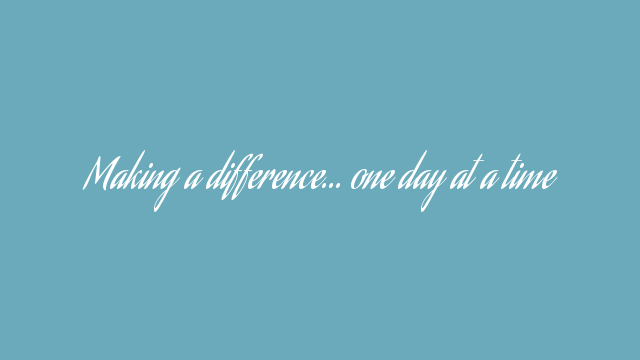
Make a Difference Today
What are you doing for yourself today to make yourself healthier than yesterday? Having really big long-term goals can be great motivation, but sometimes the little things that we do day-to-day can have a really big impact on the short-term and can help us take the steps we need to get to our long-term goals. I’ve been thinking a lot lately about what these small daily, weekly and monthly changes might look like based on what the goal might be. I’d like to share with you some of my thoughts and I invite you to share your goals and how you are working towards them. I’d like to ask you what a dear friend asked me, “Are your actions in line with your goals?”
Improve your Cholesterol
The Science: Many studies tout the benefits of consuming fish, but receiving the Omega-3 fatty acids that can help lower LDL (bad cholesterol) and raise HDL (good cholesterol) can be done with a daily supplement of fish oil. These fish oils are plentiful and available at most grocers. According to the JAMA, the very property of cholesterol that makes it essential in cell membranes, namely, its absolute insolubility in water, also makes it potentially lethal. When it accumulates in the arterial wall it cannot be readily mobilized, and its presence eventually leads to the development of an atherosclerotic plaque. To transport cholesterol safely in the blood, its concentration must be kept sufficiently low and its tendency to escape from the bloodstream must be controlled. Find more information from JAMA here.
Real life: So, what does it mean? Eat fish that contain Omega-3, such as salmon, tuna, mackerel, herring, trout, sardines, or halibut. What if you can’t tolerate or don’t enjoy fish? Omega-3 fatty acids can also be found in some plant sources, such as flaxseed oil and algal oil. Another option is a supplement containing Omega-3. Popular brands include Barlean’s Organic Oils, Nordic Naturals and Nature Made. Some of these options have flavors such as lemon zest, strawberry, and orange flavors, which help to hide the “fishy” taste. Other good ways to improve HDL are consuming orange juice, Niacin, consuming alcohol in moderation, regular aerobic exercise, and stopping smoking.
Improve your Cardiovascular Health
The Science: The “Authors Journal”compiled by the biochemical society completed a study in 2008 that showed that obese adults benefit from both aerobic activity and strength training, in terms of cardiovascular health. “Maximal oxygen uptake and endothelial function improved in all groups; the greatest improvement was observed after high-intensity training, and an equal improvement was observed after moderate-intensity aerobic training and strength training.” For more information, click here.
Real Life: The good news of this study is that you don’t have to already be “fit” to enter the gym. Just because running isn’t an option doesn’t mean we should discount the benefits of walking. According to the Center for Disease Control (CDC), an adult from ages 18-64 needs 2 hours and 30 minutes (150 minutes) of moderate-intensity aerobic activity (i.e. brisk walking) every week. They also recommend muscle-strengthening activities on 2 or more days a week that work all major muscle groups (legs, hips, back, abdomen, chest, shoulders, and arms). Joining a local walking group, joining a www.MeetUp.com group, or getting involved in a local sport such as a kickball or softball league can get you out there and having fun. Walking fast, water aerobics, riding a bike on level ground, playing doubles tennis, and even pushing a lawn mower qualify as moderate activity. Every little bit helps your health. For more info, click here.
HPV and other STDs
The Science: HPV is probably the most common STD (some estimates say ~70% of all adults have evidence of previous infection), with most infected people never evidencing its two major effects: genital warts, and cervical neoplasia (pre-cancerous or cancerous changes, detected as an abnormal Pap smear). It is an STD caused by skin or mucous membrane contact with an infected person. Different strains of HPV cause genital warts and cervical cancer.
Real Life: If you have noticed changes in your body or your partner’s body, have it checked out – today. I know it can be difficult. It can be embarrassing. Your health and the health of those you love are worth a trip to the doctor. If you don’t have insurance, see my article on low-cost local medical clinics. If you have questions regarding your sexual health, there is a local website called lesbianSTD.com where you can ask questions and receive answers from Dr. Jeanne Marrazzo. Dr. Marrazzo is an Associate Professor of Medicine (Infectious Diseases) at UW and also directs the Seattle STD/HIV Prevention and Training Center. Kathy Ringwood, LICSW, also works on the website community project and is a clinical social worker who manages the Vaginal Health Project and other studies at HMC Women’s Research Clinic.
In closing, you can absolutely make a change today that will benefit your health. From adding more Omega-3 fatty acids to your diet, to including more walking in your daily tasks, to finally getting that blood test you’ve been putting off. You have the ability to make changes to get you closer to where you want to be in life, in health, in fitness. So, friend, do your actions match your goals?
Read more from Stacey’s health and wellness column here!
Article originally appeared on The Seattle Lesbian (http://www.theseattlelesbian.com/).

